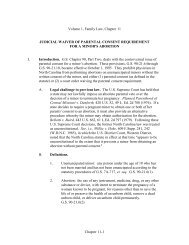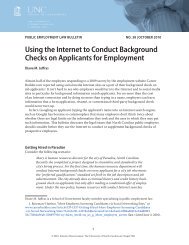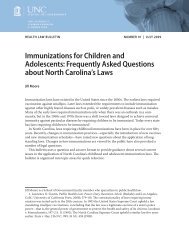Responding to Subpoenas for Health Department Records
Responding to Subpoenas for Health Department Records
Responding to Subpoenas for Health Department Records
- No tags were found...
You also want an ePaper? Increase the reach of your titles
YUMPU automatically turns print PDFs into web optimized ePapers that Google loves.
September 2005 <strong>Health</strong> Law Bulletin No. 82A subpoena <strong>to</strong> appear at a deposition is morelimited. For cases in state court, a North Carolinaresident is required <strong>to</strong> attend a deposition only in thecounty where he or she lives, is employed, orconducts business in person. 17 If the subpoena directsyou <strong>to</strong> attend a deposition outside these areas, youmay contact the issuing party and request that the sitebe changed. If the issuing party is unwilling <strong>to</strong>change the site of the deposition, you should consultwith an at<strong>to</strong>rney about submitting written objectionsor making a motion <strong>to</strong> quash the subpoena.Revised Rule 45 of the North Carolina Rules ofCivil Procedure does not contain geographic limits<strong>for</strong> subpoenas <strong>to</strong> produce records at a person’s officewhen no deposition is scheduled; however, the samegeographic limits may apply as with subpoenas <strong>for</strong>depositions. 18Question 14. Can the recipient berequired <strong>to</strong> go out of state?The answer depends on the type of proceeding.A subpoena issued under the authority of a court ofanother state and served on a person in NorthCarolina is ineffective. For example, a subpoenaissued under the authority of a Georgia state courtwould be ineffective <strong>to</strong> require a Raleigh resident <strong>to</strong>attend a proceeding in this state or in Georgia. (Thecaption of the subpoena should identify the courtfrom which the subpoena is issued.) This is one of thefew situations in which you may safely disregard asubpoena. Even here, however, you probably should17. See N.C. R. CIV. P. 30(b)(1); Wilson v. Wilson,124 N.C. App. 371, 477 S.E.2d 254 (1996) (person wholived, was employed, and transacted all business inGuil<strong>for</strong>d County could not be held in contempt <strong>for</strong> failing<strong>to</strong> comply with subpoena <strong>for</strong> deposition in ForsythCounty). Ordinarily, a person who is not a resident of NorthCarolina may be required <strong>to</strong> attend a deposition only in theNorth Carolina county in which he or she is staying orwithin fifty miles of the place of service of the subpoena.See N.C. R. CIV. P. 30(b)(1). For cases in federal court, therules differ on how far a person may be required <strong>to</strong> travelwithin North Carolina. See FED. R. CIV. P. 45(b)(2).18. Revised Rule 45(c)(4) and (5) do specify where amotion <strong>to</strong> quash or compel compliance must be filed—namely, in the court of the county in which the documentsare <strong>to</strong> be produced. But, those provisions do notspecifically address where the document production may bescheduled.consult with an at<strong>to</strong>rney be<strong>for</strong>e deciding how <strong>to</strong>proceed. 19Federal courts have greater authority <strong>to</strong> compelwitnesses <strong>to</strong> travel outside their home states. In acriminal case in federal court, a subpoena potentiallycould direct a witness <strong>to</strong> attend a trial anywhere inthe United States. In civil cases in federal court, thegeneral rule is that a subpoena may require a personin one state <strong>to</strong> attend a proceeding in another state ifthe proceeding is within one hundred miles of theplace of service of the subpoena. 20Question 15. Is the recipient entitled <strong>to</strong>any fees in responding <strong>to</strong> a subpoena?You are entitled <strong>to</strong> an appearance fee of fivedollars <strong>for</strong> each day of your attendance plus travelexpenses (discussed further in the next question). Theprocedure <strong>for</strong> obtaining these fees differs in civil andcriminal cases. In civil cases (including both trialsand depositions), the party who subpoenaed you is19. See Minder v. Georgia, 183 U.S. 559 (1902)(establishing that a subpoena is ineffective beyond statelines); see also Wilson v. Wilson, 124 N.C. App. 371, 477S.E.2d 254 (1996) (disobeying order entered by court thatlacks jurisdiction does not amount <strong>to</strong> contempt). Otherdevices may be used <strong>to</strong> direct a witness <strong>to</strong> attend an out-ofstateproceeding or at least <strong>to</strong> obtain a witness’s testimony.A party may use the Uni<strong>for</strong>m Act <strong>to</strong> Secure Attendance ofWitnesses from without a State in Criminal Proceedings(G.S. 15A-811 through 15A-816) <strong>to</strong> compel a witness <strong>to</strong>attend a criminal proceeding in the court of another state.The party seeking the witness’s attendance must apply <strong>for</strong>an order from both the state court in which the criminalproceeding is pending and the home state of the witness.See also Jay M. Zitter, Annotation, Availability underUni<strong>for</strong>m Act <strong>to</strong> Secure the Attendance of Witnesses fromwithout a State in Criminal Proceeding of Subpoena DucesTecum, 7 A.L.R. 4th 836 (1981) (under Uni<strong>for</strong>m Act, ou<strong>to</strong>f-statewitness may be required <strong>to</strong> produce documents aswell as give testimony). There is no procedure <strong>for</strong>compelling a person who is not a party <strong>to</strong> the case <strong>to</strong> attenda civil proceeding in the court of another state; however, aparty may be able <strong>to</strong> require a person <strong>to</strong> submit <strong>to</strong> adeposition in North Carolina <strong>for</strong> use in a proceeding inanother state. See N.C. R. CIV. P. 28(d).20. See FED. R. CRIM. P. 17(e) (stating rule in criminalcases); FED. R. CIV. P. 45(b)(2) (stating general rule <strong>for</strong>subpoenas in civil cases and noting possible exceptions). Incases in federal court, a party also may compel a nonparty<strong>to</strong> submit <strong>to</strong> a deposition in North Carolina <strong>for</strong> use in aproceeding in another state. See FED. R. CIV. P. 45(a)(2).7













